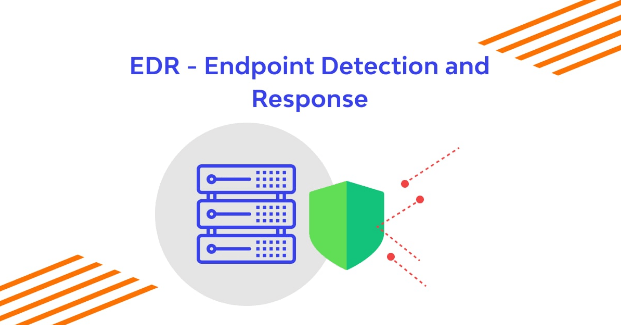Cybercrime's victim count has increased from 6 victims per hour to 97. It's almost a 1517% boost over the last 20 years.
Meaning of EDR: Today, every business needs digital defense. And traditional security measures like antivirus or malware need to be improved. You need a proactive security approach, which comes from EDR.
Meaning of EDR
Need to know what is the meaning of EDR? Well, it's time to continue reading and know the meanings, functionality, advantages, and potential role of EDR in defending computer networks against online cyber threats.
Meaning of EDR - It stands for Endpoint Detection and Response. It is software that aids in the identification of malicious activity on networks and devices. In this fast-paced digital age where types of equipment are full of cyber threats and malware, the EDR is a crucial tool for maintaining information security.
It can identify hidden cyber threats that may have escaped by more conventional security measures such as antiviruses or firewalls. EDR technology intends to lessen the impact of any malicious activity that has already taken place as well as to lessen the risks connected with malicious activity, such as sensitive data theft and system disruption.

What is The Meaning of EDR and Understand How EDR Works
Meaning of EDR - Endpoint Detection and Response (EDR) technology enable more effective incident response by giving organizations crucial knowledge about how an attack happened and what additional steps should be taken to prevent or reverse the attack. Endpoint Detection and Response (EDR) stores data on its secure cloud server storages.
Meaning of EDR - EDR technology can automate security procedures and lessen the manual labor needed to maintain a secure system. EDR security solutions examine events from:
- laptops,
- medical services,
- tablets,
- point of sale systems (POS),
- desktop computers,
- scanners,
- mobile devices,
- digital printers,
- Internet devices,
- wearables, servers,
- and even cloud spaces.
Meaning of EDR: Endpoint devices can connect or communicate with a central network system.
Endpoint Detection and Response (EDR) aids in forensic investigations, extraordinarily detailed and automatic measurement of wireless transmission of data from remote sources is monitored continuously and analyzed for malware to comprehend precisely what an attacker did to compromise the device. Over time, it expanded to include a broader range of features, including endpoint security and malware protection.
There are three main areas where endpoint detection and response work such as it work to detect:
- who and how has anyone logged in to a machine?;
- which programs has he used or run on the machine?;
- And what are the names of the files he has created on the system?
What is the Meaning of EDR and What are the Benefits of Endpoint Detection and Response (EDR)
Organizations can benefit significantly from endpoint detection and response (EDR) solutions regarding security and risk control. Go through the below to learn the meaning of EDR.
Enhanced Threat Visibility Across Endpoints
They offer improved visibility into the activities of endpoint devices, enabling organizations to monitor better and manage the security of their networks and others.
Besides, continuous monitoring and scanning also find the starting point of malware and can reverse the action that happened by antivirus. Because of this visibility, businesses can react quickly in the event of a security incident, stopping the spread of malicious software and minimizing any potential damage.
Automatic Threat Response
Endpoint Detection and Response (EDR) solutions can also offer automated cyber threats detection, enabling businesses to recognize malicious activity immediately and take the necessary precautions to limit potential harm. This automated detection decreases the time and resources required for manual investigation compared to traditional antivirus software. These progressive attacks can rarely be checked in real-time.
Endpoint agents are allowed to store and collect data solely for investigation. They produce alerts to give the upper hand to security operations analysts in identifying, analyzing, and resolving problems.
Threat intelligence and Analysis
Eventually, a security critic must try to understand the attack's intent to determine whether it's vicious or malware. Many attacks must be discovered and responded to; these attacks can be highly harmful to the system. The assigned team to security work needs EDR statistics to find and kill the threats on time.
In addition to gathering telemetry data on suspicious activity, endpoint detection and response (EDR) tools may also add additional contextual information from related events to the data. By performing these tasks, EDR helps incident response teams respond more quickly and, ideally, removes threats before they cause harm.
Meaning of EDR: Importance of Endpoint Detection and Response
To sum up, you finally know what is the meaning of EDR and its benefit.
Indeed, EDR technology is crucial for businesses trying to prevent malicious activity and defend their systems against potential cyber threats.
Today, security professionals are facing security challenges and the latest cyber threats with every passing day. Thereby, they need next-generation EDR (endpoint detection and response) to overcome those issues.
As hackers use new ways to harm machines and storage, endpoint detection and response (EDR) requirements need to be upgraded with time. A timely response to those threats can save organizations from the cost of cyber threats.
What is the Meaning of EDR: Xcitium's EDR Security Solution
Cybercrime may cost the world 10.5 trillion annually by 2025.
If you want to prevent this cost of a cyber breach, it's time to install Xcitium EDR, which can create a protective shield all around your endpoints and help you stay two steps ahead of cybercriminals.
